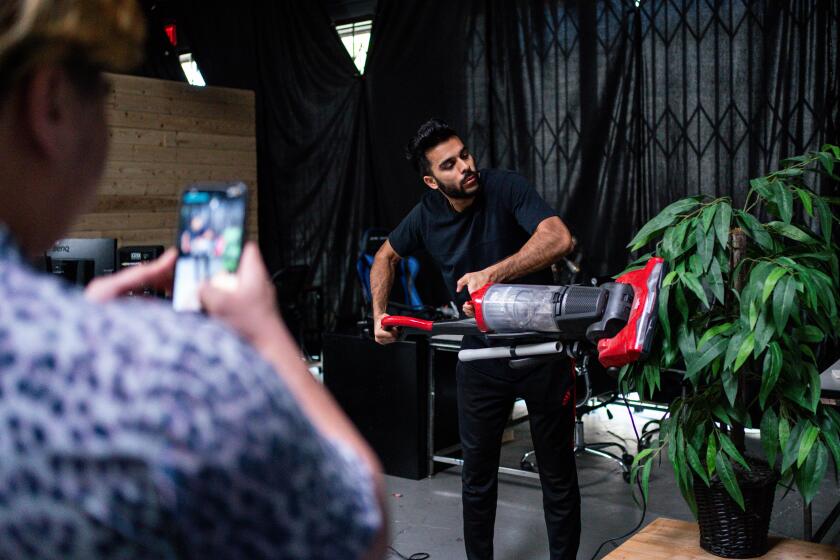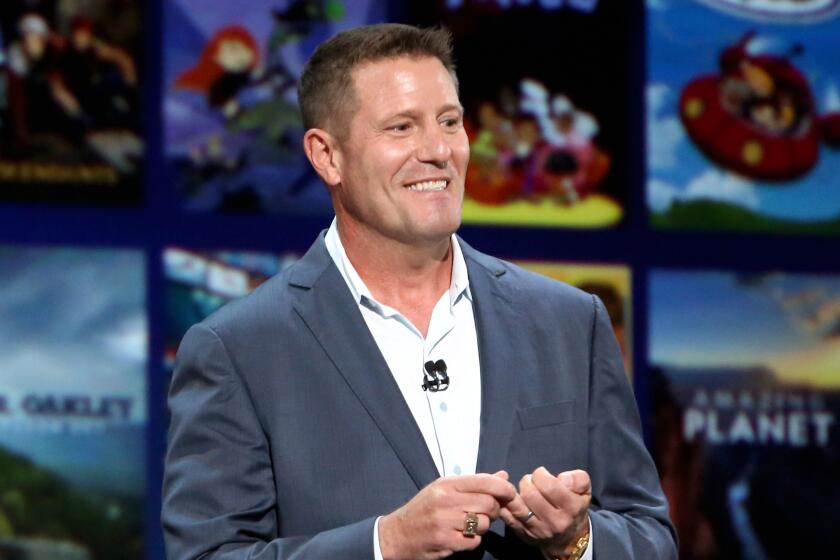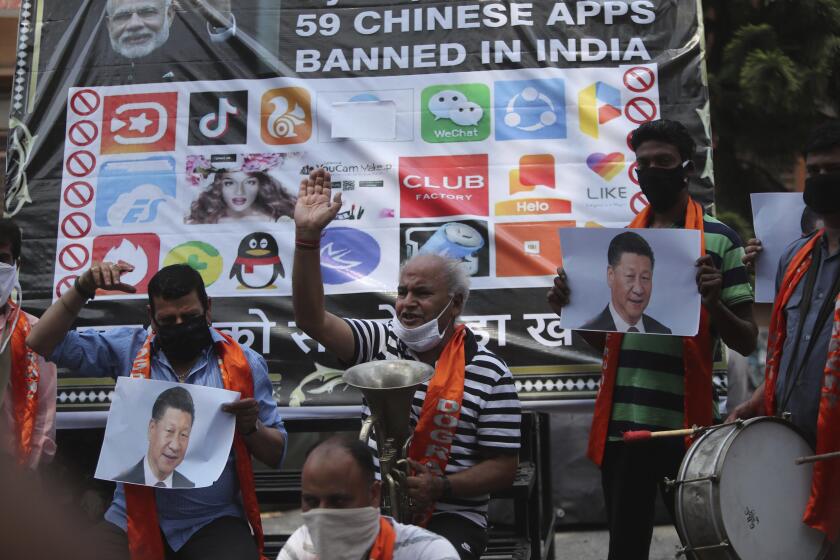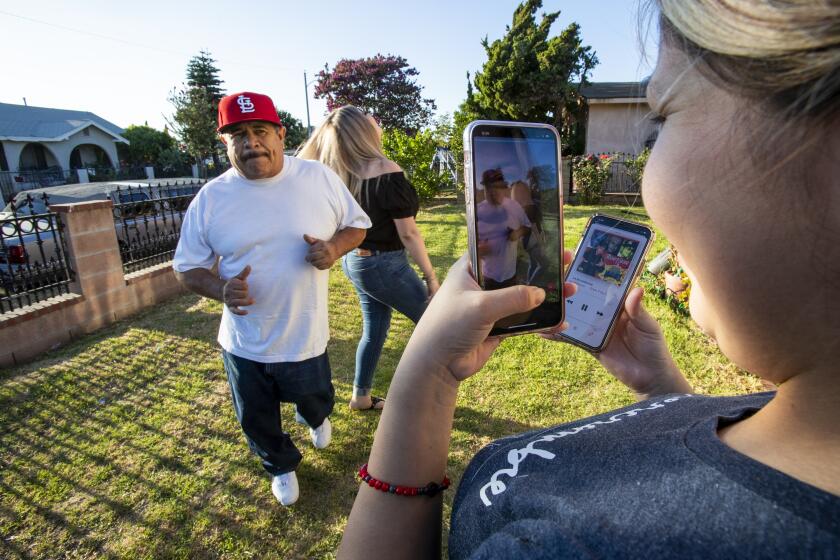Influencer exits. Ban threats. Can TikTok weather the storm?
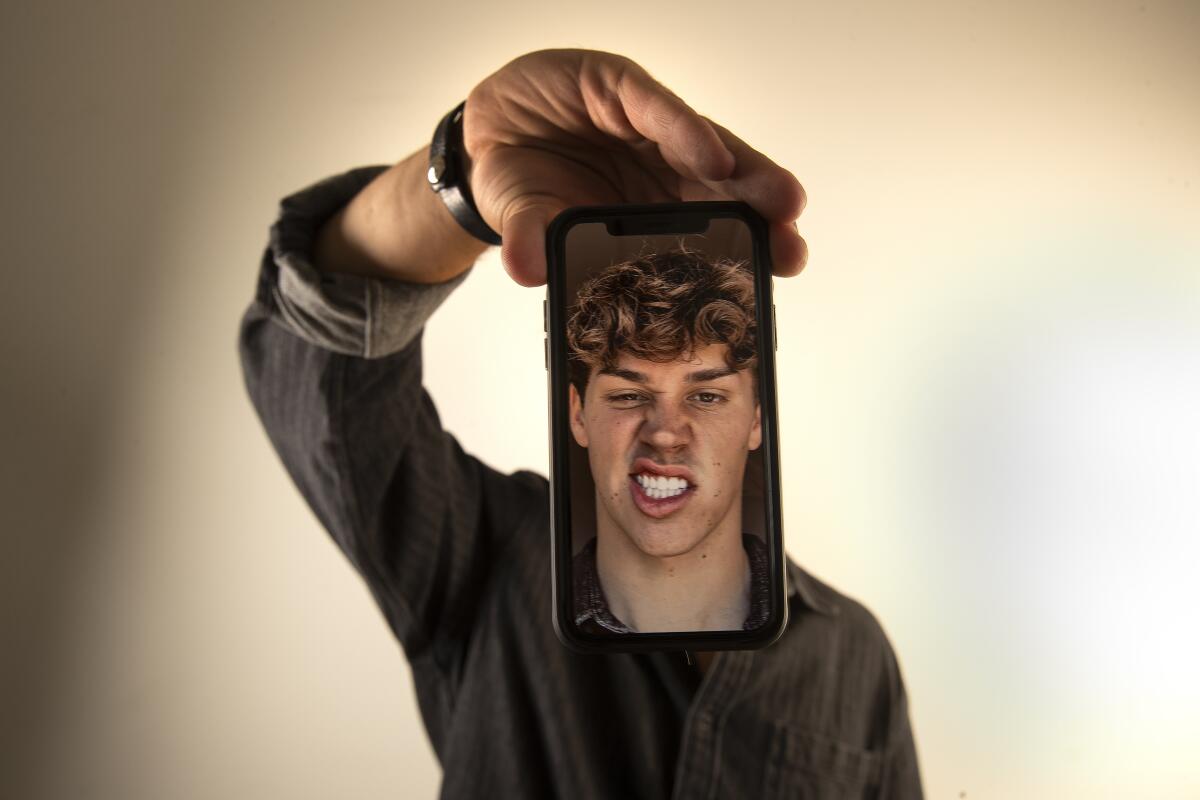
- Share via
TikTok has been a lucrative part of 17-year-old Katie Feeney’s life.
The Maryland teenager has 4 million followers on the popular app who enjoy watching her videos of opening up packages and performing dance moves. In a month, Feeney can make $12,000 on brand deals and promotions. But she fears that may soon dry up.
“I was really upset because I always knew that at some point TikTok probably wouldn’t last, but I never thought it would be this soon,” Feeney said. “Right when I’m starting to gain a huge following. ... It’s super disappointing.”
Feeney is among a growing number of influencers who are worried about TikTok’s future as the social video app faces growing scrutiny from the U.S. government, rising competition from rivals such as Facebook and the defection of top level creators.
TikTok, owned by Chinese tech company ByteDance, has become a formidable force in the entertainment industry. The app launched in the U.S. in 2018 after ByteDance bought lip-synching app Musical.ly.
Music artists such as Lil Nas X have used the platform to build momentum for their songs to become hits. Talent agencies discover rising stars through the app, and celebrities have posted trending dance videos to better connect with fans. TikTok remains the most installed app in the world, according to San Francisco mobile research firm Sensor Tower.
TikTok, a popular based social video app owned by China-based ByteDance, has seen explosive growth this year amid the coronavirus crisis. The company has plans to hire more people, including at its Culver City office.
But the company’s rapid growth and success have also made it a target — and a pawn in the Trump administration’s widening trade conflict with China. American government officials have considered banning the app, and two senators asked the Department of Justice to investigate whether TikTok disclosed private information about U.S. consumers to the Chinese government, which the company has denied.
TikTok is showing no signs of retreating. The company has been on a massive hiring spree, saying it plans to add 10,000 people to its U.S. staff over the next three years. The company employs roughly 1,400 people in the U.S., with its largest office in Culver City.
“People in L.A. consider it to be the cool kids’ place,” said Eugene Lee, chief executive of ChannelMeter, a San Francisco-based business that provides analytics and monetization for social video creators. “But that said, I think at the back of their minds, they’re probably all wondering, ‘Will we have a job in six months?’”
TikTok says its app gives advertisers more choices and believes all companies should disclose their algorithms to regulators.
Rivals have begun to smell blood. Facebook-owned Instagram will launch a similar feature to TikTok called “Reels” in the U.S. next month. And L.A.-based Triller, which operates a music video app, has lured popular TikTok creators to its platform.
“It’s an opportunity for Facebook,” said Elma Beganovich, chief operating officer of New York-based influencer marketing agency A&E. “If they can come up with, basically, features that are very much like TikTok, there’s no reason for the influencers to tell their audience, ‘Hey, come follow me on these channels.’”
Facebook Chief Executive Mark Zuckerberg on Wednesday touted his company’s American roots at a congressional subcommittee hearing on anti-trust, pointing out that a decade ago, most of the top tech companies were American. Now, half are Chinese, Zuckerberg said.
Some legislators have questioned companies including Facebook and Google, pointing out that they’ve grown so powerful it’s hard for other businesses to compete with them. Facebook, Google and Amazon combined have a 62% share of digital ad revenue in the U.S., according to research firm eMarketer. TikTok says its presence helps increase competition.
Zuckerberg said Facebook values freedom of expression, as well as an open and competitive marketplace.
“These are fundamental values for most of us, but not for everyone in the world, not for every company we compete with or the countries they represent as global competition increases,” Zuckerberg said.
TikTok says its app gives advertisers more choices and believes all companies should disclose their algorithms to regulators.
TikTok Chief Executive Kevin Mayer fired back on Wednesday, saying that he is committed to the long-term availability of the app and welcomes competition.
“But let’s focus our energies on fair and open competition in service of our consumers, rather than maligning attacks by our competitor — namely Facebook — disguised as patriotism and designed to put an end to our very presence in the U.S.,” Mayer said in a statement.
TikTok said protecting U.S. user privacy is of the “utmost importance” and it has not and will not give U.S. user data to the Chinese government. The company says U.S. customer data is stored in the United States with backup storage in Singapore.
Earlier this year, the company announced a transparency and accountability center in Culver City that lets outside experts learn about their content moderation policies and the code behind their algorithms.
Still, Trump said that the government is looking at potentially banning TikTok, following other countries including India that have raised security concerns.
The Chinese video-sharing app is booted from its biggest foreign market as India retaliates for a deadly border clash.
While the U.S. government cannot ban TikTok, it can make it harder for the company to have commercial relationships with U.S. businesses, said Jeff Poston, co-chair of the law firm Crowell & Moring’s privacy and cybersecurity group.
Such a move could cause Apple to “de-platform” TikTok, making it harder for people to access the app, he added.
The U.S. has taken punitive action against Chinese tech manufacturer Huawei, requiring foreign semiconductor companies who use U.S. equipment to apply for licenses before they can ship products to Huawei.
Already, some U.S. companies such as Wells Fargo have asked staffers to remove TikTok from company mobile devices. Amazon sent a similar warning to its staffers and later said the message was sent in error.
Multiple lawsuits have been filed against TikTok, accusing it of storing the facial geometry of users without their permission and sending private data to China. Privacy advocates also filed a complaint with the Federal Trade Commission alleging TikTok has continued to store and collect children’s data, even after it agreed not to.
To be sure, cutting TikTok out of the U.S. market would benefit its American competitors.
“Part of the reasons that foreign governments, especially the United States, are targeting TikTok is because of the global competition for these technologies,” said Eric Harwit, a professor of Asian Studies at the University of Hawaii. “If you’re using TikTok, then you’re maybe not using Instagram as much.”
Facebook and Google, which owns YouTube, have entered mainland China’s market in the past, but their products have been kept out because of the Chinese government’s controls over content.
“It’s unfair that YouTube is not allowed. It’s unfair that Facebook is not allowed there,” Lee said. “If you’re going to say these apps are not allowed there, you shouldn’t be surprised for a returning country to say your apps are not allowed in my country too.”
Under China’s law, the government can request tech companies provide information in cases of national security or a criminal investigation, Harwit said. Those that don’t comply could be fined or have their executives arrested, he added.
TikTok has tried to distance itself from its Chinese roots. Corporate parent ByteDance is incorporated in the Cayman Islands, but was founded in China and is based there. Some speculate that ByteDance may sell its stake to reduce Chinese ownership in the firm.
Meanwhile, the company has been expanding its largest U.S. office in Culver City, hiring former Disney executive Mayer as its CEO. He is also the chief operating officer of ByteDance.
“Kevin Mayer’s impeccable track record in M&A at Disney across Marvel, Lucasfilm, Fox and more, coupled with his understanding of how tech and media come together with the launch of Disney+, is clearly a signal of what is to come at TikTok,” said Chris Jacquemin, co-head of digital at talent agency WME. “I’d fully expect some major acquisitions in the future and a positioning of TikTok to potentially become a U.S. entity.”
WME represents TikTok stars including Addison Rae and Chase Hudson.
Charli D’Amelio who? These dads are blasting to the top of Latinos’ For You Pages with #mexicandadsbelike and other relatable hashtags.
TikTok’s popularity has grown in the U.S., especially during the pandemic as people look for ways to entertain themselves at home. Brands are keen to market to the app’s younger audiences.
“What TikTok has done is really mastered the ability for the community at large to be both watchers as well as creators,” said Brian Mandler, co-founder of the Network Effect, a New York company that connects influencers with brands. “You have the ability to literally pick up your phone, use your camera for 15 seconds and have the ability to become TikTok-famous.”
But the government scrutiny of TikTok has also put some creators in a bind, as they consider whether to build their audience on a platform and make brand deals on an app that could disappear.
Noah Beck, a 19-year-old former college soccer player with 9.1 million TikTok followers, recently joined rival app Triller as an advisor and investor.
TikTok stars including Josh Richards, said they plan to leave TikTok for L.A.-based video-sharing app Triller.
“When I read the articles talking about national security issues, I’m like, ‘I don’t feel too safe on this,’” said Beck, who lives in Bel-Air.
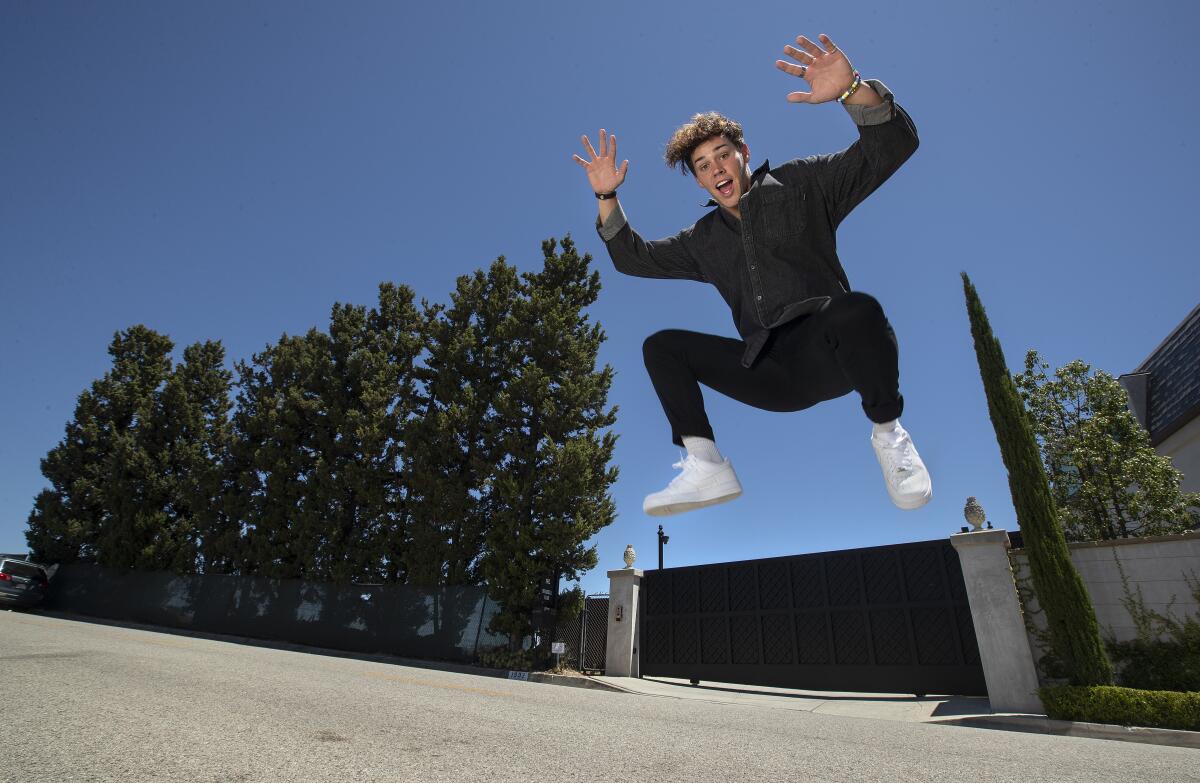
Several video creators, however, remain comfortable with TikTok.
Kacey Welch, a 39-year-old celebrity hairdresser, was amazed that a video of her coloring a TikTok influencer’s hair got more than 6 million views in 48 hours.
“It’s one of the many tools I’m using for marketing,” she said.
TikTok recently announced a $200-million creator fund in the U.S. to help support people posting original content on its platform. The company plans to increase that fund to more than $1 billion in next three years.
West Hollywood singer-songwriter Bryce Xavier said he was excited to hear about the fund and plans to apply for it. The 18-year-old, who has 2.7 million followers on TikTok, recommends people give the app a try.
“TikTok has great content and is an amazing platform for people to be a part of,” Xavier said.
More to Read
Inside the business of entertainment
The Wide Shot brings you news, analysis and insights on everything from streaming wars to production — and what it all means for the future.
You may occasionally receive promotional content from the Los Angeles Times.
